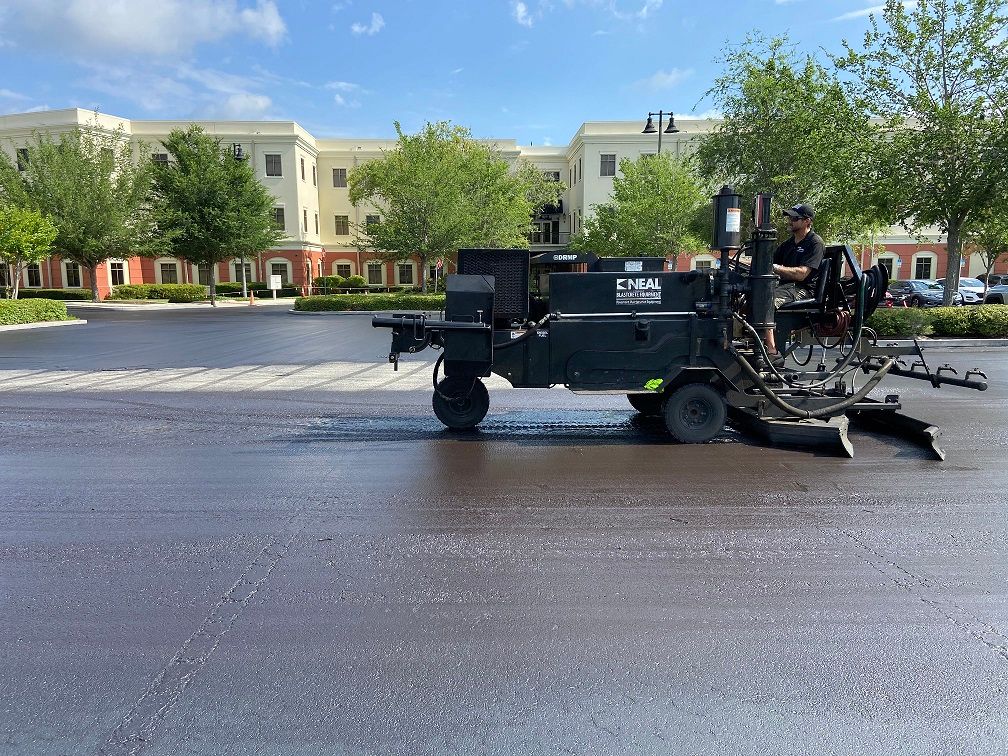

Choosing the right paving material for your driveway, parking lot, or walkway is a significant decision that affects both your property's appearance and your wallet. Two materials dominate the paving landscape: asphalt and concrete. Each offers distinct advantages and challenges, making the choice between them more complex than it might initially appear.
Understanding the key differences between these materials will help you make an informed decision that serves your needs for years to come. From upfront costs to long-term maintenance requirements, climate considerations to aesthetic preferences, multiple factors influence which option makes the most sense for your specific project.
This guide breaks down everything you need to know about asphalt and concrete paving, helping you weigh the pros and cons of each material so you can choose with confidence.
Upfront Installation Costs
Asphalt typically costs less to install than concrete, making it an attractive option for budget-conscious property owners. The material itself is less expensive, and the installation process requires fewer specialized steps. Most asphalt projects cost 30-40% less than comparable concrete installations.
Concrete requires more labor-intensive installation and higher material costs. However, this initial investment often pays dividends through reduced maintenance needs and longer lifespan.
Long-Term Financial Considerations
While asphalt saves money upfront, it requires more frequent maintenance. Seal coating every 2-3 years and occasional repairs can add up over time. Concrete, though more expensive initially, may prove more economical over 20-30 years due to its durability and lower maintenance requirements.
Consider your timeline when making this decision. If you plan to sell your property within 10 years, asphalt's lower initial cost might make more sense. For long-term property ownership, concrete's durability could provide better value.
Asphalt Longevity
Well-maintained asphalt typically lasts 15-20 years before requiring major repairs or replacement. The material performs well under normal traffic conditions but can develop cracks and potholes over time, especially in areas with freeze-thaw cycles.
Regular maintenance significantly extends asphalt's lifespan. Proper seal coating, crack filling, and timely repairs can help asphalt surfaces reach their full potential lifespan.
Concrete Durability
Concrete pavements often last 25-30 years or more with minimal maintenance. The material's strength makes it ideal for heavy traffic areas and commercial applications. Properly installed concrete resists cracking and maintains its structural integrity longer than asphalt.
However, when concrete does crack or suffer damage, repairs can be more complex and expensive than asphalt fixes. The key lies in proper installation and using quality materials from the start.
Heat Performance
Florida's intense heat affects both materials differently. Asphalt absorbs heat and can become soft during extremely hot days, potentially leading to tire marks or impressions from heavy vehicles. The dark surface also contributes to higher temperatures around your property.
Concrete reflects more heat and maintains a cooler surface temperature. This makes it more comfortable for walking and can help reduce cooling costs for nearby buildings.
Weather Resistance
Orlando's frequent rain and humidity create unique challenges for both materials. Asphalt's flexible nature helps it handle minor ground movement from moisture changes, but standing water can accelerate deterioration.
Concrete handles moisture well once properly cured, but sudden temperature changes can cause cracking. Florida's relatively stable temperatures work in concrete's favor, as freeze-thaw cycles cause the most concrete damage in northern climates.
Asphalt Maintenance Schedule
Asphalt requires consistent attention to maintain its appearance and functionality. Key maintenance tasks include:
Concrete Maintenance Needs
Concrete demands less frequent but potentially more expensive maintenance:
The reduced maintenance frequency makes concrete appealing to property owners who prefer minimal ongoing involvement in pavement care.
Asphalt Installation
Asphalt installation happens relatively quickly. After proper site preparation and base laying, the asphalt can be applied and compacted in a single day for most residential projects. The surface becomes usable within 24-48 hours, though full curing takes several weeks.
Weather plays a crucial role in asphalt installation. The material needs warm temperatures for proper application and compaction, making installation timing important in any climate.
Concrete Installation
Concrete installation requires more time and patience. After site preparation, concrete needs proper mixing, pouring, finishing, and curing. The curing process alone takes 28 days for concrete to reach full strength, though light traffic may be possible after 7 days.
The extended timeline means concrete projects require more planning and patience, but the result is a more permanent solution.
Budget and Financial Planning
Consider both immediate budget constraints and long-term financial goals. Asphalt's lower upfront cost helps with immediate cash flow, while concrete's durability may provide better lifetime value.
Property Use and Traffic
Heavy traffic areas benefit from concrete's superior strength. Residential driveways with light vehicle traffic work well with either material, making other factors more important in the decision.
Aesthetic Preferences
Concrete offers more design flexibility with colors, patterns, and textures. Asphalt provides a classic, uniform appearance that many property owners prefer for its simplicity and traditional look.
Maintenance Preferences
Consider your willingness and ability to maintain your pavement. If you prefer minimal ongoing maintenance, concrete's reduced needs might justify its higher initial cost.
Choosing between asphalt and concrete paving depends on your specific needs, budget, and long-term goals. Both materials can provide excellent service when properly installed and maintained. The key lies in working with experienced professionals who understand local conditions and can guide you toward the best choice for your property.
If you need professional asphalt paving in Orlando, FL, contact Florida Sealcoating today for a free estimate.
Get a free, no-obligation estimate for your asphalt project. Our team is ready to help protect and enhance your property.
(407) 942-3681